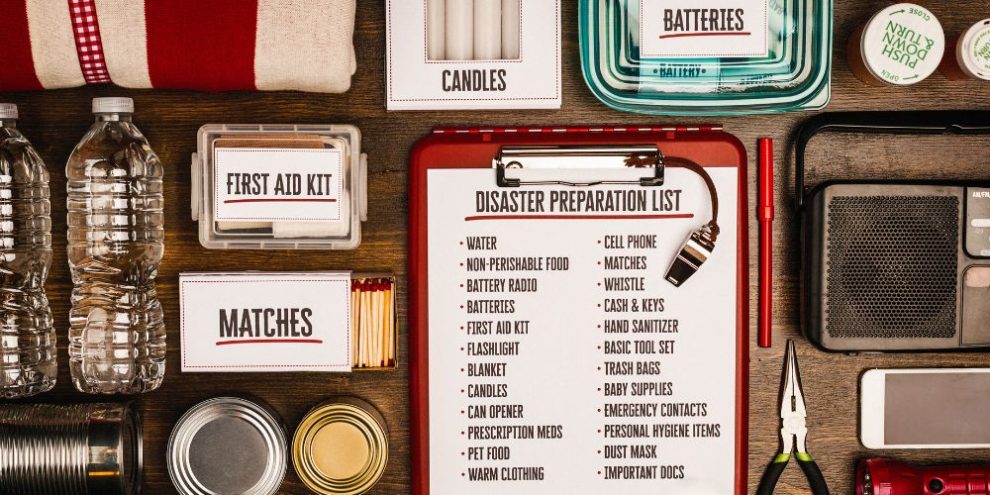
Disasters can strike anytime, anywhere. Tornado, fires, power outages, lock downs – while we can't control these events, we can control how prepared we are to face them.
Taking steps towards emergency preparedness gives you peace of mind and empowers you to take care of yourself and your loved ones during a crisis.
Barrie's News Delivered To Your Inbox
By submitting this form, you are consenting to receive marketing emails from: Central Ontario Broadcasting, 431 Huronia Rd, Barrie, Ontario, CA, https://www.cobroadcasting.com. You can revoke your consent to receive emails at any time by using the SafeUnsubscribe® link, found at the bottom of every email. Emails are serviced by Constant Contact
Why prepare?
Emergencies can disrupt essential services, leaving you without power, water, or communication for extended periods. Being prepared allows you to react calmly and efficiently, ensuring your safety and well-being. This can:
- Reduced Stress: Knowing you have a plan reduces anxiety and allows you to focus on staying safe.
- Protect Loved Ones: A prepared household protects everyone who lives there, especially vulnerable family members.
- Help You Recover Faster: Having supplies on hand allows you to start recovery efforts quickly.
Before the emergency
The key to weathering any storm is preparation.
While it’s a good idea to research common risks in your area, not everything can be planned for. In this section, we'll explore the steps you can take to get your family and home ready for whatever comes your way.
1. Create a plan
Discuss potential scenarios with your family and establish a plan for specific emergencies and emergencies in general. Here are some things to consider when developing your plan:
COMMUNICATION PLAN
- Battery-Powered Radio: Make sure to have a battery powered radio in your home and office so you have access to up-to-date information during any type of emergency.
- Communication Methods: Establish how you'll communicate with each other if phone lines are down. Consider texting, email, or using a specific radio channel.
- Out-of-Town Contact: Identify a trusted contact person who lives outside your area. This person can serve as a central message point for everyone to check in with and confirm their safety. Make sure everyone has this persons phone number memorized.
EVACUATION PLAN
- Escape Routes: Identify multiple evacuation routes out of your neighborhood in case one becomes blocked or dangerous.
- Transportation: Determine how everyone will evacuate, whether it's by car, public transportation, or on foot.
- Special Needs: If someone in your household has limited mobility or requires medical equipment, factor in their needs during the evacuation process.
SHELTER IN PLACE PLAN
- Immediate Safety: Discuss where family members should seek shelter in different emergency situations. For example, you want to go to upper floors for floods, to basements for tornadoes, under sturdy furniture for earthquakes and, if you can’t escape, into lockable rooms during an invasion.
- Meeting Place: Choose an area inside and outside of your home where everyone should gather once immediate danger has passed. Choose a location that's unlikely to be affected by the emergency itself.
ADDITIONAL CONSIDERATIONS
- Shutoff Procedures: Know how to shut off utilities like gas and water in case of a leak.
- Home Inventory: Take a video inventory of your belongings for insurance purposes. This can help expedite the claims process after a disaster.
- Pet Plan: Include provisions for your pets in your emergency plan. This may involve having a pet carrier, extra food, escape equipment, and identification tags readily available.
- Documentation: Keep copies of important documents like insurance policies, passports, birth certificates, and social security cards in a safe deposit box or waterproof container. Having securely stored digital copies is also a good idea.
- Practice: Regularly practice emergency drills with your family to ensure everyone knows what to do.
By incorporating these elements into your plan, you can ensure a more coordinated and efficient response during an emergency. Remember to review and update your plan regularly to reflect any changes in your household or surroundings.
2. Build an emergency preparedness kit
An emergency kit is your lifeline during a crisis, providing essential supplies to help you survive until help arrives or normalcy is restored.
Grant Durfee, the newly appointed head of emergency management for Simcoe County, explains, "Everyone should have a 72-hour kit ready, with food, water, clothing, and essential supplies, including medications and pet supplies ... In winter, extra blankets, warm clothing, and traction aids like kitty litter are vital. In summer, focus on staying cool and hydrated."
Here's a breakdown of what to include in your emergency kit:
BASIC SUSTENANCE
- Water: Aim for one gallon of water per person per day for at least three days. Include a variety of sizes for drinking and sanitation purposes.
- Non-perishable Food: Stock your kit with easy-to-prepare, non-perishable food items with a long shelf life. Canned goods, energy bars, granola bars, and dried fruit are all good options. Don't forget a manual can opener if you have canned goods stored separately.
SHELTER AND WARMTH
- Emergency Blanket: A lightweight, reflective emergency blanket can help retain body heat in cold weather.
- Spare Clothing: Pack a change of clothes and a couple pairs of socks and underwear for each family member.
- Seasonal Clothing: Pack seasonally appropriate clothes for each family member, including warm layers like hats, gloves, and sturdy shoes for winter, and thin layers for summer. Consider including rain gear like a poncho or raincoat, as well.
- Plastic Sheeting and Duct Tape: These can be used for creating a temporary shelter or sealing windows.
COMMUNICATION & ELECTRONICS
- Back-up Radio: Always have a radio readily available at home to stay informed about the situation and receive updates from emergency services. In addition, include a second battery-powered or hand crank radio in your go bag in case you have to evacuate quickly.
- Cell phone Charger: Make sure you have chargers and cables for important electronics, such as your phone, medical devices, etc.
- Battery Backup: Consider investing in a portable power backup to charge phones and devices until power returns.
- Flashlight: Include a battery-powered or hand-crank flashlight in your kit. Extra batteries are essential.
FIRST AID AND SANITATION
- First-aid Kit: A well-stocked first-aid kit is essential for treating minor injuries and illnesses. Include any items specific to your family's medical needs.
- Medications: Include a seven-day supply of any prescription medications and over-the-counter medications your family needs regularly.
- Sanitation Items: Pack personal hygiene items like soap, hand sanitizer, feminine hygiene products, and toilet paper to maintain cleanliness. Wet wipes can also be useful for sanitation.
ADDITIONAL ESSENTIALS
- Comfort Items: Whether it is a favourite snack, treasured toy or family heirloom, be sure everyone has an item that will help keep them calm and comfortable.
- Cash: Keep a small amount of cash on hand in case of power outages or disruptions to electronic banking systems.
- Copies of Important Documents: Include photocopies of important documents like passports, birth certificates, insurance cards, and proof of residence in a waterproof container.
- Whistle: A whistle or other noise maker can be a useful tool for signaling for help.
- Multi-purpose Tool: A multi-purpose tool can be helpful for a variety of tasks.
- Dust Mask: A dust mask can help filter contaminated air.
- Pen and Paper: Include a pen and notepad for keeping track of important information or leaving messages.
- Kitty Litter: Keeping traction aids, like kitty litter, in your car is a good idea in the winter.
Remember to review and update your kit every six months, replacing expired items and ensuring everything is in working order. It’s also a good idea to have separate kits for your home, car, and workplace to ensure preparedness in various situations.
3. Prepare your home
Living in Barrie and Simcoe County brings the beauty of the Canadian seasons, but also the potential for various emergencies. From power outages during winter storms to sudden thunderstorms, being prepared can make a world of difference. Here's how to fortify your home for different emergencies:
- Secure loose objects on shelves and bookcases to prevent them from falling during earthquakes or strong winds.
- Trim tree branches around your home, especially those close to power lines and house, to minimize damage from falling debris during storms.
- Have a fire extinguisher readily available in a central location and ensure everyone in your household knows how to use it.
- Ensure smoke and carbon monoxide detectors are functional with fresh batteries. Test them monthly!
- Maintain a clear path for exits in case of fire or other emergencies.
- Store flammable liquids and chemicals safely away from heat sources.
- Turn off or unplug appliances during storms to prevent power surges.
- Consider waterproofing your basement and installing a sump pump with a battery backup to prevent flooding.
- Ensure proper insulation in your home to retain heat during power outages.
- Invest in weather stripping or caulking to seal drafts around windows and doors.
4. Stay informed
Don't be caught unaware! Staying informed is crucial during emergencies.
Sign up for local alerts through push notifications, SMS, emails, and social media to ensure you’re the first to know about emergencies, road closures, and evacuation orders.
When something seems amiss or you suspect bad weather is coming, tune into local news broadcasts during severe weather events to stay updated on the latest developments and safety information.
You also want to be sure you understand the weather updates. "Know the difference between a watch and a warning," Durfee underscores. A watch means there's potential for severe weather. Warnings mean that the weather is occurring or imminent.
Durfee continues, "If you hear thunder or see lightning, get inside immediately. For tornadoes, find the lowest interior room in your building. Never seek shelter under bridges, as they can act like wind tunnels."
By incorporating these resources into your routine, you'll be empowered to make informed decisions and keep yourself and your family safe.
Barrie's News Delivered To Your Inbox
By submitting this form, you are consenting to receive marketing emails from: Central Ontario Broadcasting, 431 Huronia Rd, Barrie, Ontario, CA, https://www.cobroadcasting.com. You can revoke your consent to receive emails at any time by using the SafeUnsubscribe® link, found at the bottom of every email. Emails are serviced by Constant Contact
During the emergency
Emergencies can be chaotic and stressful. Here’s what you should focus on during a crisis. If you’re afraid you’ll be too overwhelmed to remember, make a quick list and include it in your emergency kit.
1. Follow Your Plan: If an emergency strikes, put your plan into action. Stay calm and prioritize the safety of yourself and your family.
2. Stay Informed: Tune into Kool FM or Rock 95 to get the latest emergency updates from Barrie 360 in real time.
3. Evacuate if Necessary/Shelter in Place: Pay close attention to official instructions. If instructed to shelter in place, find a safe interior room, away from windows and doors. Stay informed about the situation through your battery-powered radio. If evacuation is ordered, don't hesitate – leave quickly and follow designated routes. Bring your evacuation kit with you.
4. Help Others Safely: Once you've ensured your own safety, only then assist others who may need help. Don't put yourself at further risk.
5. Limit Phone Use: Cell networks are often congested during emergencies. Only use your phone for critical calls and avoid data-heavy activities. Text messages often go through when calls don't.
6. Use Social Media with Caution: Social media can be a source of updates, but be wary of unverified information. Look for updates from official sources to ensure you’re receiving the best information.
After the emergency
The aftermath of an emergency can be overwhelming. This section will guide you through the initial steps of recovery, from checking for safety hazards to contacting loved ones and seeking assistance.
1. Continue Monitoring: Stay tuned in on your radio for updates on the situation's status and instructions from officials. Be prepared to quickly respond to another emergency.
2. Contact Loved Ones: Once the situation allows, check in with family and friends as planned.
3. Assess the Situation: Once it's safe to do so, check for injuries and damage to your home. Be cautious of hazards like downed power lines or leaking gas.
4. Start Recovering: Begin cleaning up your property and take steps to prevent further damage. Utilize your emergency kit supplies as needed.
5. Seek Help: Don't hesitate to seek assistance from emergency responders or relief organizations.
By following these steps, you and your family can stay informed and connected during emergencies in Barrie and Simcoe County.
Remember, a little preparation can go a long way in ensuring everyone's safety and well-being.






